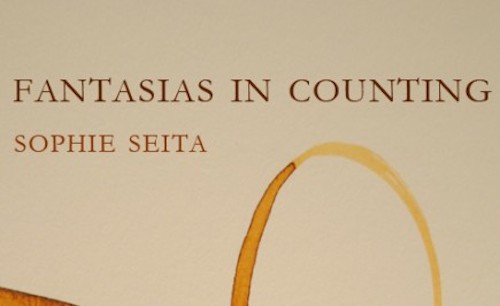Sophie Seita's Intricate Fantasias in Counting

Translator and poet Sophie Seita's book of "performance textuality," Fantasias in Counting (BlazeVOX Books, 2014) is reviewed by Ian Brinton at Tears in the Fence. Brinton also notes Seita's translation work with Uljana Wolf:
It seems to me entirely appropriate that Sophie Seita should have become the translator of Uljana Wolf’s Babeltrack (Notes on a Lengevitch), part of which is published in the splendidly presented new issue of Cambridge Literary Review edited by Lydia Wilson, Rosie Šnajdr and Jeremy Noel-Tod. Incidentally this new issue, which is subtitled ‘The Children’s Issue’, is guest-edited by Eve Tandoi:
the dissolution of the linguistic sound system in aphasics provides an exact mirror-image of the phonological development in child language, writes Jakobson, as if aphasia made the child’s acquisition of speech possible in the first place and with it every production of sound in developmental stages, as if it held the mirror or provided rules, folie oder folly, as if we could find in this very bad sound-production disorder a blueprint for what is to come…
Brinton's "folie oder folly" aligns with his looking at Seita's conversing:
The abundance of silk in the room effortlessly implies the taken-for-grantedness of cultured persons conversing in pleasant company.
Of course the word ‘conversing’ is right! They are not simply talking; they are cultured and what they immerse themselves in is effortlessness!
In October 2013, in Cambridge, J.H. Prynne wrote some words for Ian Heames’s publication of Will Stuart’s Nine Plays (Face Press 2014) and it is worth recalling these:
These are then radical experiments, radically unfamiliar in their effects and modalities, built up from speech registers redolent with common life and its credible lumpen similitudes; they are done with most palpable courage in the face of imminent damage to their own logic.
Sophie Seita’s ‘AN EXERCISE’, part of a sequence of poems titled ‘just pick a line’, opens with the concluding line of the previous poem, A DIAGRAM, sitting slapbang in the centre of the page opposite its title:
The one thing that interested me about the poem was that it was not yet there.
This is a delightfully provocative and uplifting statement and I found myself dwelling on the weight of that final word. After all, ‘there’ is such a placed word; it has such a self-justifying sense of itself; it is the final word of an argument which you think you have won…‘there’. It has also such a sense of the finished, the past, the unmoving. . . .
Read the full review here.


